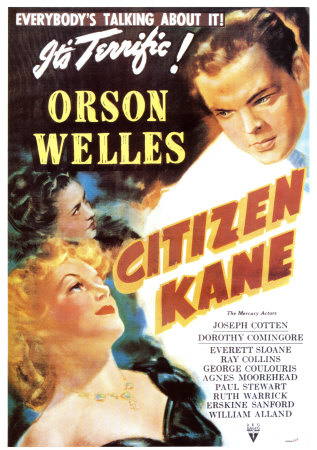Chief among my surprise was the overall look of the film. Welles frames almost every shot in the entire film that it could be a still picture. Each frame is deliberate and filled almost to bursting with details. These very same details are what set this film apart from its contemporaries. The perception of modern generations is that old films were generally more 'theatric'. This is to say that acting was more of a grand melodrama than an acute approximation of real life. In keeping with this trend, movie sets of the time felt more manufactured. A set was indeed a set; meant to give context to location but not become anything more than dressing for a scene. Citizen Kane defies this tradition as every location in every scene has character. The world of this film feels very much real, very much believable. This tactile sense lends a gravity to the film that can't be denied and establishes Citizen Kane as a true departure from the theatrical roots of the art form.
Aiding in its picturesque quality is the lighting. Welles lit the film from an artistic eye. Dramatic and contrasting shadows paint every scene in gritty realism. Actors' faces are not always lit perfectly, and they move across the scene through beams of light cascading from windows or lamps. Still, even though the lighting may lend itself to reality, one cannot shake the sense that every ray is cast with purpose. Every silhouette adds to the frame that, combined with the elaborate settings and locations, demands to be taken in by the eye. Citizen Kane is a film that employs almost every tactical advantage of the form and achieves it with effortless perfection. No one element of this film ever arrests your suspension of disbelief or strains the logical understanding of information. Even while it reaches for both cinematic and technical heights, Citizen Kane never feels like its presuming to be anything more than it is. In essence, each element bolsters the next to simply exist; nothing more.
The above elements would be enough in many cases to justify the lasting impression of the film to modern audiences were it not for the story. In strokes both grand and mundane, this paradox of achievement is in no small part testament to the greatness of this film. By definition, capturing the scope of a human life in the span of a couple of hours is grand enough achievement on its own. To maintain the feeling that said human life is just as real and actual (mundane) as any other is perhaps more crucial. There is no denying that the film pivots and flourishes exclusively from Charles Foster Kane. All at once Kane is equal parts Bruce Wayne and James Bond -- possessing all the reckless excess of those characters while at the same time their tragic flaws and adding an intangible human element. Kane is the quintessential archetype for ordinary man of ordinary means thrust into extraordinary wealth or circumstance. This makes him engrossing and relatable all at once, and it is his gravitas as well as his presence that makes the film work. Indeed, in some ways Citizen Kane isn't even about its titular character. Instead it often chooses to focus on his very effect on those around him in an attempt to better understand his life. This movie is a lot like life in that it is about context. The context of one life in light of itself. The context of the lives of others in contrast to another. Citizen Kane endures because it's simple on a level anyone can understand.
Finally, and many of my classmates have commented on this in their posts, Citizen Kane teaches an important lesson. Charles Kane is a man who could have anything and yet always lacked for substance. There are many scenes illustrating this point in the film, perhaps none more resonant than Leland and Kane's late night discussion on the eve of his losing the race for governor. There, a drunken Leland actualizes the dilemma of Kane's entire life. Kane gives in an attempt to gain, but instead of a monetary gain he wishes for an emotional one. Simply put he wants to be loved and from this he achieves both his greatest successes and his most profound failures. In the end I believe it all winds down to his final words: Rosebud. Kane was a child plucked at an unbelievably young age from his childhood and forced to be scion to a wealth he didn't choose. Rosebud is his childhood sled, but more than that it is his stolen childhood. It is the stolen love of his mother and his family. Rosebud is the unspoken rejection by his mother which in turn is the denial of the most basic thing a person needs -- love. The rest of Kane's life is a pursuit of that lost moment. He fills it with people and gestures and possessions, none of which is able to fill the hole in his being -- a hole that was compensated for by an overbearing selfishness. Not a selfishness born of malice or want, but an unconscious one at a fundamental level.
What I am trying to say is that Citizen Kane in the context of its main character is a story about being human. It lasts because even though it is slightly larger-than-life, it maintains a sentiment everyone lives on a daily basis. This combined with its technical feats make Citizen Kane more than substantial enough to bear lasting study and adoration not just for now, but for times to come. If nothing else, this film is undeniably 'tight'. Tight in the sense that its parts are as good as its whole, and nothing in its narrative is a stretch of the mind. Perhaps this is why it has avoided critical scrutiny and, more importantly, the test of time.


No comments:
Post a Comment